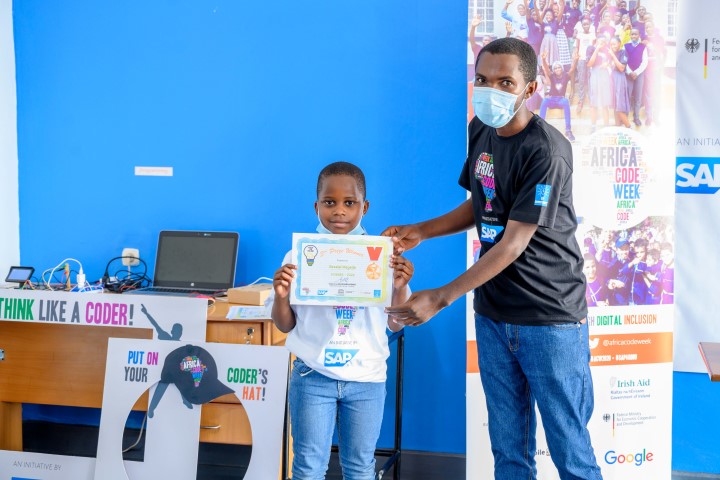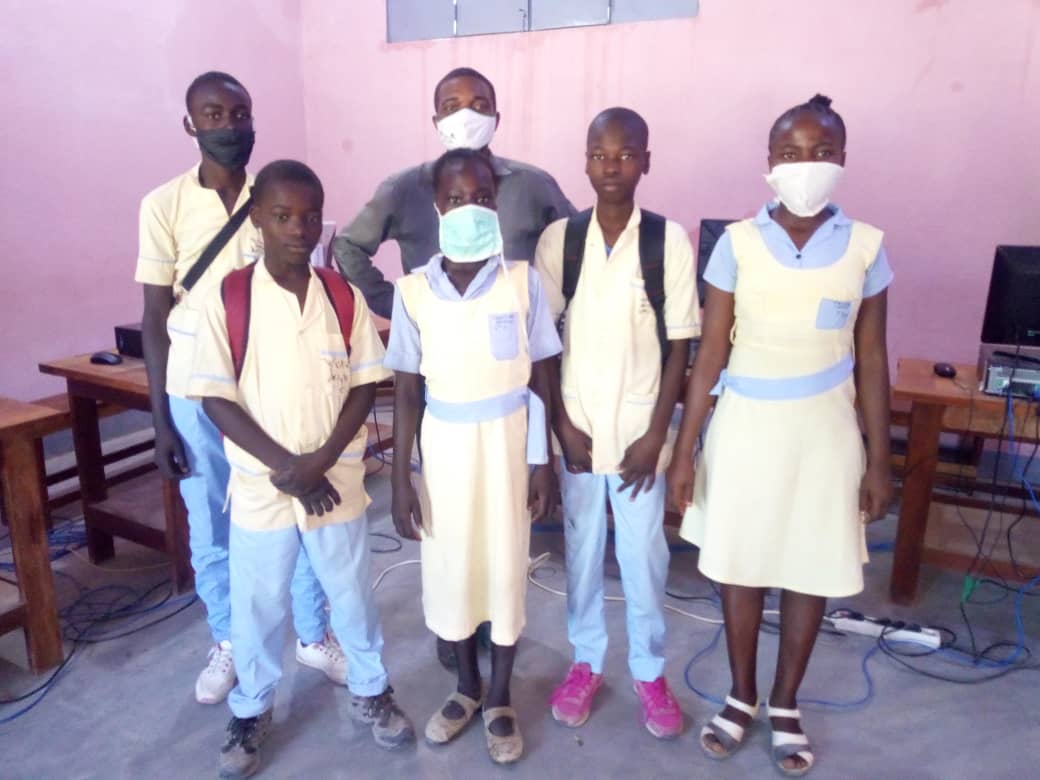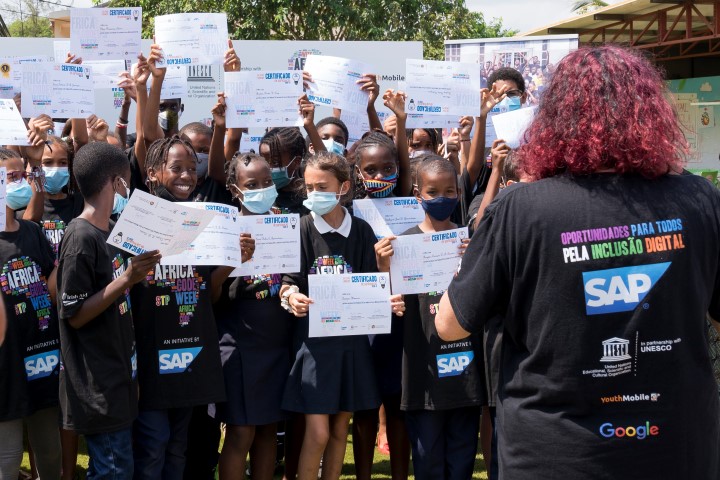Despite Covid-disruption, SAP Africa Code Week hosts Train-the-Trainer sessions in Libya, Mauritania with educators showing strong interest in digital literacy
Collaboration with Ministries of Education aimed at building sustainable skills development capacity
Digital literacy amidst conflict and pandemic
Two countries in the north of Africa affected by recent or ongoing conflict may be turning the corner on digital skills development for youth and teachers in 2021. Despite the challenges with internet access, lack of access to technology and ongoing conflict, interest in digital skills is high among learners and teachers alike in both Libya and Mauritania.
Dorsaf Benna Chelly, SAP Africa Code Week coordinator in North Africa, is upbeat about the interest shown by educators – including the Ministries of Education – in both countries.
“2020 was the first year that hosted Train-the-Trainer sessions in Libya and Mauritania and continues to grow in attendance and popularity. The goal is to equip teachers with skills and knowledge to support digital learning in the country, and to inspire a new generation of young Africans to build a better future using technology as an enabler. The response from educators in Libya and Mauritania shows healthy interest in digital literacy and skills development and point to a shift in how both countries are preparing their youth for the 21st century digital economy.”
Building blocks of a brighter future for Libya’s youth
Did you know?
- Libya is in a state of civil war as rival factions seek control of the government. The World Food Programme estimates that 435 000 people have been displaced by the conflict.
- When the pandemic emerged in early 2020, it prompted school closures across Libya, leaving 1.3 million learners suddenly out of school. The Libyan government worked with local television stations to broadcast compulsory lessons for middle and secondary school children.
- The Libyan Ministry of Education also partnered with UNICEF to support digital teaching platforms, provide technical supplies such as tablets and computers, and improve internet connectivity.
- According to World Bank data, only 22% of the population in Libya had access to the internet in 2017.
Dr Muna Naas, Africa Code Week coordinator for Libya and member of the Libyan Ministry of Education, says:
“Work is underway by the Libyan government to meet the long-term education requirements for youth and ensure every learning is equipped to take part in the global digital economy. As the main conduits of learning, teachers play an invaluable role in preparing our youth for a bright future. This makes the positive response from local educators to our first-ever Train-the-Trainer workshops all the more encouraging.”
Last year a total of five Train-the-Trainer sessions were held in the country in September and October, with 67 teachers taking place. Twelve of the teachers were female. In 2021 this figure is set to increase during the months of October to December.
“For many of the teachers, this was their first contact with coding,” says Benna Chelly. "We have also mobilised support among teachers for the AfriCAN Code Challenge, a relatively new initiative at this year’s Africa Code Week that seeks youth aged 8 to 16 to foster a wide range of essential skills, from coding to problem-solving and teamwork, and compete in a competition to help unleash their super powers through coding creativity.”
Scaling teaching impact in Mauritania
Despite constant government investment in the education sector, Mauritania has not yet achieved universal primary school enrolment. According to the World Bank, the country’s learning outcomes remain low, partly due to teachers’ limited qualifications and skills.
In addition, only one in five people in Mauritania have access to the internet according to 2017 data. This adds further complications to the provision of digital learning in the country.
According to Cheikh Konaté, Member of the National Assembly of Education in Mauritania, improving the quality of education is critical to the country’s economic growth and human capital development efforts. “As the gatekeepers on knowledge and learning, teachers are invaluable in helping us prepare our youth for the future. With the support of our public and private sector partners, hundreds of teachers participated in the first-ever Train-the-Trainer workshops in our country, and gained first-hand experience with new digital learning and teaching schools.”
Benna Chelly points to the ongoing interest in ACW Train-the-Trainer sessions among educators in Mauritania.
“Across six sessions held virtually in September last year, a total of 214 teachers participated, gaining first-hand knowledge of basic coding and digital literacy skills which they can take back to their classrooms to empower local youth."
More than 39 000 teachers in 37 countries were mobilised during the 2019 Africa Code Week. This year, with an all-virtual format due to the impact of the pandemic, Africa Code Week is taking place across all African countries, with a month-long series of virtual coding sessions taking place across the continent during October to December.
Hicham Iraqi Houssaini, Managing Director of SAP Francophone Africa concludes:
“While the pandemic has upended the lives of learners and teachers across the continent and disrupted schooling, it has also created opportunities. The growing urgency to provide learning through digital channels is driving greater interest in digital skills among learners and teachers alike. Teaching young kids to code is a gift that will endure for decades to come. If we harness our most precious resource – our abundance of youthful talent – Africa will go from strength to strength in 2021 and beyond.”
For more information about Africa Code Week, please visit www.africacodeweek.org
About Africa Code Week
Since 2015, SAP Africa Code Week (ACW) has been creating free opportunities for young Africans to learn coding skills and for teachers to be trained on digital learning curricula. Strong partnerships with the public, private and civil society sectors across 54 countries are driving sustainable impact by building teaching capacity and supporting the adoption of coding into national curricula in support of UN Sustainable Development Goals 4, 5 and 17. Join SAP and partners by visiting www.africacodeweek.org to find out more.
About SAP
SAP’s strategy is to help every business run as an intelligent enterprise. As a market leader in enterprise application software, we help companies of all sizes and in all industries run at their best: 77% of the world’s transaction revenue touches an SAP® system. Our machine learning, Internet of Things (IoT), and advanced analytics technologies help turn customers’ businesses into intelligent enterprises. SAP helps give people and organizations deep business insight and fosters collaboration that helps them stay ahead of their competition. We simplify technology for companies so they can consume our software the way they want – without disruption. Our end-to-end suite of applications and services enables business and public customers across 25 industries globally to operate profitably, adapt continuously, and make a difference. With a global network of customers, partners, employees, and thought leaders, SAP helps the world run better and improve people’s lives. For more information, visit www.sap.com.



